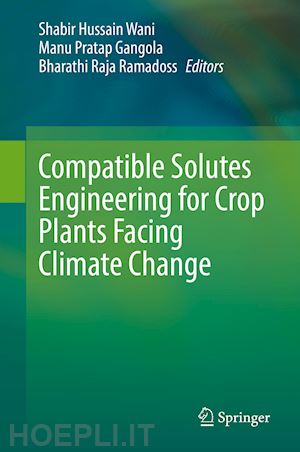
Questo prodotto usufruisce delle SPEDIZIONI GRATIS
selezionando l'opzione Corriere Veloce in fase di ordine.
Pagabile anche con Carta della cultura giovani e del merito, 18App Bonus Cultura e Carta del Docente
1. Recent advances in plant adaptation to climate change – An introduction to compatible solutes
2. Osmosensing and signaling in plants - Potential role in crop improvement under climate change
3. Amino acids other than proline and their participation in abiotic stress tolerance
4. Engineering glycine betaine biosynthesis in alleviating abiotic stress effects in plants
5. Improvement of abiotic stress tolerance by modulating polyamine pathway in crop plants
6. Engineering fructan biosynthesis against abiotic stress7. The ?-Aminobutyric Acid (GABA) towards abiotic stress tolerance
8. Sugar alcohols and osmotic stress adaptation in plants
9. Crosstalk of compatible solutes with other signalling pathways in plants
10. Effect and importance of compatible solutes in plant growth promotion under different stress conditions
11. Compatible solute engineering: An approach for plant growth under climate change
Dr. Shabir Hussain Wani Assistant Professor (Senior Scale) cum Scientist, Genetics and Plant Breeding at Mountain Research Centre for Field Crops, Khudwani, Sher-e-Kashmir University of Agricultural Sciences and Technology, Srinagar J&K, India. He received Ph.D. degree in plant breeding and genetics on “transgenic rice for abiotic stress tolerance” from the Punjab Agricultural University Ludhiana, India. He then joined the Krishi Vigyan Kendra (Farm Science Centre) as program coordinator (i/c) at Senapati, Manipur, India. He teaches courses related to plant breeding, seed science and technology, and stress breeding and has published more than 200 papers/chapters in journals and books of international and national repute. He served as guest editor and reviews editor for journal Frontier in Plant Science (2015-2018). He has also edited several books on current topics in crop improvement for abiotic stress tolerance published by Springer Nature and CRC press USA. His Ph.D. research fetched first prize in the North Zone Competition, at national level, in India during 2009. He also received Young Scientist Award (Agriculture) 2015 from Society for Plant Research, Meerut, India. He also served as visiting Scientist at Department of Plant Soil and Microbial Sciences, Michigan State University, USA under the UGC Raman Post Doctoral Fellowship programme during 2016-17. He was elected as Fellow of Linnean Society of London 2017. Recently he was felicitated with Award for Excellence in Research 2020 from Novel Research Academy, Puducherry, India. Recently Dr. Wani was selected as member of Expert Working Group (EWG) Wheat Initiative for Adaptation of Wheat to Abiotic Stress (AWAS), Berlin, Germany during January 2021. He is also elected as Joint Secretary (Asia) for the Society for Plant Research, Vegetos (2021-2024). Currently, he is in charge of Wheat improvement programme at MRCFC Khudwani SKAUST Kashmir under the ICAR-All India Coordinated Improvement Project on Wheat and Barley.
Dr. Manu Pratap Gangola is a review editor for Plants (Multidisciplinary Digital Publishing Institute, Basel, Switzerland), Nutrients (Multidisciplinary Digital Publishing Institute, Basel, Switzerland), Cereal Research Communication (AkadémiaiKiadó, Hungary), Plant Genetic Resources (Cambridge University Press, UK), and International Journal of Agronomy (Hindawi Publishing Corporation, NY, USA). He works at the Department of Plant Sciences of University of Saskatchewan, Canada.
Dr. Bharathi Raja Ramadoss is a Research Associate (Plant Breeding and Genetics) at the Bioriginal Food and Science Corporation, Saskatoon, Canada. He received his B.Sc degree in Agriculture and his M.Sc and Ph.D. degrees in Plant Breeding and Genetics from the Tamil Nadu Agricultural University (TNAU), India. He is the recipient of the global Monsanto-Beachell Borlaug International Scholarship -2012 for his Ph.D. research work entitled Allele Mining through EcoTILLING by sequencing for reduced starch digestibility in rice. He was also awarded Brig. Anil Adlakha Award -2016 for the best Ph.D. thesis in rice at TNAU, India. After obtaining his Ph.D. he worked as a research associate in the Department of Biotechnology, TNAU, India. He also worked as a Post-Doctoral Researcher at the Department of Plant Sciences, University of Saskatchewan, Canada. He also cleared National Eligibility Test (NET) for Assistant professorship/Lectureship in Crop Improvement, Genetics and plant breeding conducted by the Agricultural Scientists Recruitment Board (ASRB), New Delhi. He has participated in several national and international conferences in the United States, Canada, Thailand, and India and also published 10 international 5 national 5 book chapters in peer-reviewed journals. He also served as a reviewer for various international journals (Frontiers in Nutrition, Frontiers in Genetics, Plant Genetic Resources – Cambridge University Press, Cereal Research Communication (Akadémiai Kiadó, Hungary) – Springer, and Starch – Wiley Publishers). Currently, he is working on improving gamma-linolenic acid (GLA) content in borage.











Il sito utilizza cookie ed altri strumenti di tracciamento che raccolgono informazioni dal dispositivo dell’utente. Oltre ai cookie tecnici ed analitici aggregati, strettamente necessari per il funzionamento di questo sito web, previo consenso dell’utente possono essere installati cookie di profilazione e marketing e cookie dei social media. Cliccando su “Accetto tutti i cookie” saranno attivate tutte le categorie di cookie. Per accettare solo deterninate categorie di cookie, cliccare invece su “Impostazioni cookie”. Chiudendo il banner o continuando a navigare saranno installati solo cookie tecnici. Per maggiori dettagli, consultare la Cookie Policy.